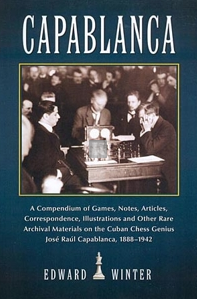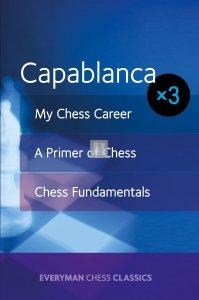Capablanca, the prodigious ascent (1888-1920) - HARDCOVER
Bertola Georges

This first volume reveals the rise of the young chess prodigy José Raúl Capablanca, who learnt the game at the age of 4 and a half by watching his father play. He did not belong to any school and did not study chess other than by practising intensely. He was quickly regarded as a phenomenon, and his illustrious predecessor, Emanuel Lasker, the 2nd world champion in history, had to admit: ‘I have known many chess players, but only one genius: Capablanca’.
Descrizione
This first volume reveals the rise of the young chess prodigy José Raúl Capablanca, who learnt the game at the age of 4 and a half by watching his father play. He did not belong to any school and did not study chess other than by practising intensely. He was quickly regarded as a phenomenon, and his illustrious predecessor, Emanuel Lasker, the 2nd world champion in history, had to admit: ‘I have known many chess players, but only one genius: Capablanca’.
Through 111 games that illustrate his style, which has often been described as limpid and based on excellent technique, I have tried to bring him back to his time by emphasising his human qualities. I have covered the key moments in his biography up until Capablanca became the undisputed contender for the world title, which he won in 1921.
Replaying his games can make the game seem a relatively straightforward exercise. He is remembered as the greatest endgame player of the early 20th century, but his treatment of openings is outdated.
There is nothing more deceptive than the obvious. While this may be true for a super Grandmaster, for amateurs and club players alike, the logic of his analysis, his pragmatic vision and his positional assessments have retained much of their freshness.
His style, his efficiency and his domination over the players of his time bear some resemblance to the ‘giants’ of our time, such as Anatoly Karpov and Magnus Carlsen.
Informazioni
- Casa editrice Europe Echecs
- Codice 8673
- Anno 2024
- Pagine 344
- Isbn 9782490169108
 Italiano
Italiano
 English
English






